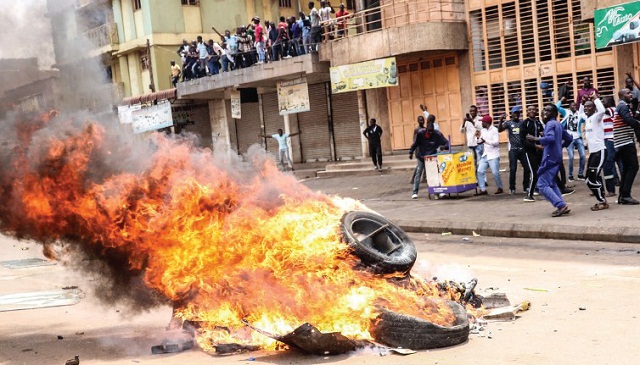
Bobi Wine accuses police of unlawfully disrupting his musical events and even barring him from attending social functions, including church.
“Besides my role as a Member of Parliament I am also a musician and that is how my family survives and indeed through that trade, I employ hundreds of Ugandans,” Bobi Wine told parliament.
But Security Minister Gen Elly Tumwine appeared to give a hint that targeting Bobi Wine was deliberate.
Rather than explain why security operatives were blocking the legislator’s concerts, he instead tasked Bobi Wine to explain how he was going to balance his music from politics.
Kadaga got irked. “I think the minister takes this as a joke,” Kadaga charged, “Why won’t the state allow Kyagulanyi to conduct his business? The form we signed when we were elected does not say if you are a dancer, stop dancing; if you are a teacher stop teaching.”
Government saved its response for Dec. 26 when another major concert by the legislator was slated. They blocked it too—this time a little more forcefully.
Police cordoned off the venue, sprayed people who had come to do business at the sidelines of the concert with teargas and dispersed them.
Observers say this is the clearest indication that Bobi Wine has become a major threat to President Museveni’s hold onto power – the reason he is being dealt with the way previous opponents have been dealt with. But while President Museveni has previously been confronted with opponents with conventional tactics he can easily deal with, Bobi Wine’s—music—could pose a tougher challenge.
Music has always been a powerful channel for political mobilisation world over and countrywide. President Museveni was able to keep the morale of rebel group and overthrow the sitting government partly through songs like `Moto wa waka’.
Across Africa, musicians have used their music to challenge authorities.
In South Africa, Miriam Makeba challenged apartheid through protest music. In Senegal, the rapper Serge Bambara, aka, Smockey founded Balai Citoyen, or Citizen Broom, a movement of artists and musicians that called on youth to rise up against a bid by longtime president Blaise Compaoré, to change the constitution and extend his rule.
The songs Smockey wrote and recorded during this period, analysts say, led to the president’s political demise. Fela Kuti became a legend across Africa for fighting corrupt military dictatorships in Nigeria.
Back to Uganda, musicians and other artists have effortlessly surfed the wave of their popularity and beaten several tested politicians to political office. Some of these include Gospel artist Judith Babirye and comedian Kato Lubwama.
Bobi Wine himself won his seat with a landslide against candidates of both the ruling NRM and Uganda’s major opposition party FDC. Riding on his victory, he campaigned for four other legislators who too trounced candidates of both the NRM and FDC—the reason he is being seen as a kingmaker of sorts.
But even before Bobi Wine became a player on the political scene, President Museveni had already taken to music himself in a bid to win the support of young voters.
This is how he embraced the rap song titled ‘You Want Another Rap?’ which some analysts have partly credited for his 2011 victory.
After realising high yields from the 2011 effort, Museveni went all out to reap from music in the 2016 elections by recruiting music stars to campaign for him. They composed `Tubonga Nawe’ (We’re With You) for him, which became his campaigning song.
Around that time, Bobi Wine distinguished himself by staying away from Museveni. Rather than join those singing President Museveni praises, he positioned as an independent voice—calling for peace in `Dembe’, a song released on the eve of elections.
 The Independent Uganda: You get the Truth we Pay the Price
The Independent Uganda: You get the Truth we Pay the Price




Tulyambala engule olutalo nga luwedde! We shall walk with swag in a new Uganda when Dictator Museveni has gone to the rubbish dump of history.?